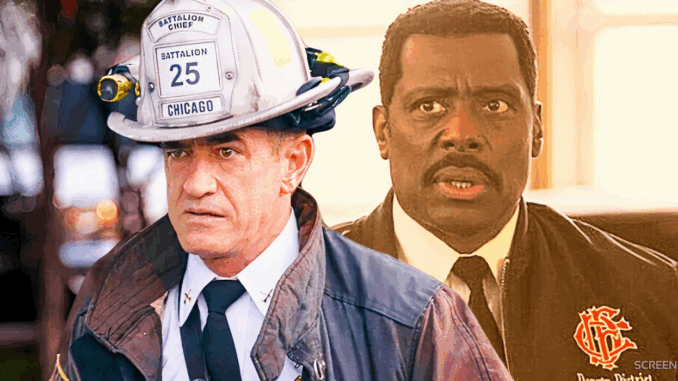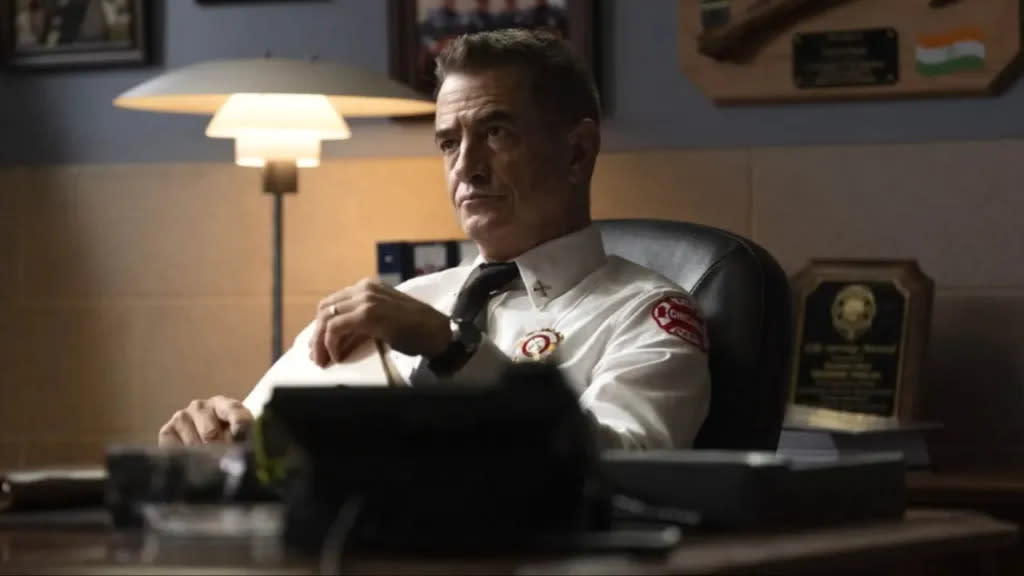
Chicago Fire Season 13, Episode 21, “The Bad Guy” is the “a-ha” episode where showrunner Andrea Newman reveals the NBC show’s plan all along. Viewers have always suspected something wasn’t right with Battalion Chief Dom Pascal, but this episode only pretends to cast him as the titular bad guy so it can pull the rug out from under the audience. Instead, this becomes a story about Firehouse 51 redeeming Pascal and fans rooting for a character they’ve sometimes hated.
“The Bad Guy” centers around a car accident that nearly killed Robert Franklin, the man responsible for Monica Pascal’s death earlier in the season. Suspicion immediately falls on Pascal, thanks to his previous behavior, but of course there’s a fourth-act twist involved. Meanwhile, Violet Mikami gets thrown one of the season’s worst subplots. What keeps this episode from being great, though, is a sense that these plot reveals could also add up to nothing in the end.
Chicago Fire Season 13, Episode 21 Recasts Pascal as the Victim
Audiences Will Root for Him More Than Ever Before
From the beginning, Chief Pascal has been cast as a sort of antagonistic character — the anti-Chief Boden. That made sense because after Boden’s departure, of course Chicago Fire wouldn’t want to bring in the exact same type of protagonist to replace him. The point of “The Bad Guy” is that it shows how much Newman and her writing staff have been playing the long game with Pascal. Moments like him punching Stephen Vale for seems hitting on his wife and setting fire to corrupt cop Bishop’s garage were just bread crumbs for this episode. The fans all certainly think Pascal got revenge on Franklin, because they’ve seen how volatile he is all season.
But Kelly Severide thinks differently. Any episode that features Taylor Kinney’s character using his sleuthing skills is always a treat; there could easily be a whole show about the Office of Fire Investigation. And it makes sense that Severide would have an open mind and not jump to any conclusions, even with Pascal; that’s just not who he is. That’s why “The Bad Guy” doesn’t do a great job of selling that as a surprise. Severide is the kind of person to look at all the evidence — and no one else in Firehouse 51 is really chomping at the bit to suggest that Pascal committed attempted murder, so there’s not as much tension as there could have been. But Kinney is excellent, particularly in the scene where Severide goes to confront Bishop about hiring someone to frame Pascal.
Chief Dom Pascal (to Herrmann): There’s a chance you’re taking over the big office sooner than we expected. This house is going to need you.
The episode makes viewers far more sympathetic to Pascal, even if its use of flashbacks is atypical. Those moments fill in the last blanks of Pascal’s history. Of course, they come too late because the cliffhanger is Pascal being arrested. It’s a dramatic final scene but it also feels a bit awkward, because Pascal has always seemed like a short-term character. The subplot of Christopher Herrmann preparing to take the chief’s test is a reminder of that. Even if Severide successfully clears Pascal’s name, it seems equally likely that Pascal will just resign and go off to get another fresh start someplace, or at least step out of Herrmann’s way. “The Bad Guy” may establish that Pascal is not a villain and never was, yet it is also just a step away from concluding his whole story arc.
Chicago Fire Gives Violet the Worst Subplot for Very Little Reason
Where Does All of This Leave Her in Season 14?

Pascal’s ending might feel inevitable, but at least it makes sense. The same can’t be said for what’s thrust upon Violet Mikami, which is some of Season 13’s most forced and out of character writing. Violet’s previously incredibly supportive boyfriend Flynn sets up a meeting for her with a doctor that he knows, and Violet thinks it’s to get a “side hustle” serving as an expert witness in court trials. Instead, the woman is offering Violet a place in a medical school program — which Violet has never wanted. This results in an argument with Flynn, which quickly escalates to Violet breaking up with him, and as if that’s not enough, she blurts out, “I’m in love with someone else.”
Violet Mikami (to Flynn): I can’t be with someone who doesn’t get me. Who doesn’t get what being a paramedic means to me.
None of this feels right in any way. Chicago Fire already tackled the paramedic vs. doctor topic when Annie Ilonzeh’s character Emily Foster left Firehouse 51 to go back to med school, so this isn’t new or even interesting thematic ground. Beyond that, Flynn has been established as a guy who’s always been very honest, so it’s very weird that he wouldn’t tell Violet what the meeting was about — let alone think he knew better about her career path than her. The whole fight comes off like a quickie reason to break them up, which is proven when Violet suddenly declares that she’s in love with somebody else… a clear reference to Sam Carver. That sentence, while expected by all the Violet and Carver shippers, feels like it’s tacked on randomly to remind audiences that Violet and Carver is still an option.
The other problem is that Violet and Carver is not really an option. Fans already know that actor Jake Lockett, who plays Carver, is being written out of the series after Season 13 due to budget cuts per Deadline’s April report. So are Violet and Carver going to have a season-ending romantic reunion that will wind up being moot by the Season 14 premiere? There’s no way this goes well for Hanako Greensmith’s character. Either Violet and Carver get together only for her to be left heartbroken (it seems unlikely the writers would put in the effort for some kind of long-distance ship, since Carver isn’t as important to the Chicago Fire universe as Brettsey), or Violet winds up with no one and still broken-hearted.
Obviously, this is a case of off-screen business spoiling on-screen story, but one can’t deny how much it impacts the viewing experience and Violet’s character moving forward. What happens to Violet here feels like what happened to Derrick Gibson previously — a character point that’s rushed through just to get things wrapped up. And Violet. who’s truly come into her own since initially being introduced as a foil for Blake Gallo, deserves better.
Chicago Fire Season 13, Episode 21 Proves Taylor Kinney Can’t Be Replaced
The Stakes Feel Lower Than Many Previous Finales, Except for Severide
“The Bad Guy” clearly sets up its dilemma for the Chicago Fire Season 12 finale — will Severide be able to save Pascal, and by extension himself, since he’s putting his career on the line to defend his chief? But it also has something of a first-world problem: by Chicago Fire’s high standards, that doesn’t feel like a huge dilemma. Fans are used to the years of co-creator Derek Haas coming up with epic finales that were huge events, often putting someone’s life at risk (usually Severide, sometimes Matthew Casey). Compared to the number of times somebody has been trapped in a burning building, whether or not the chief gets off the hook is almost quiet.
There might be something brewing in the Stella and Natalie subplot; it’s awfully convenient that Natalie’s mom is out of the picture at the same time that Severide and Stella are looking to adopt. It wouldn’t be a shocker if they take Natalie in, either legally or unofficially. Herrmann taking the chief’s test is also out there, but the show already did something similar last season when it ended with fans waiting to see if he and Mouch passed their last promotion exams. So there’s just not the same level of tension — professionally or personally — here that Chicago Fire can and has come up with before.
If anything, “The Bad Guy” just teaches viewers two things: they (understandably) misjudged Pascal this whole time, and how Taylor Kinney is really the linchpin of this entire series. Kinney — who per another Deadline report is due to re-negotiate his contract after this season — is the engine that drives Chicago Fire Season 12, Episode 21, and that’s not the first episode he’s carried. Severide’s quest for justice is what viewers will be truly invested in, regardless of whether he’s right or wrong. He’s “the good guy” in this whole equation, and this show needs him.